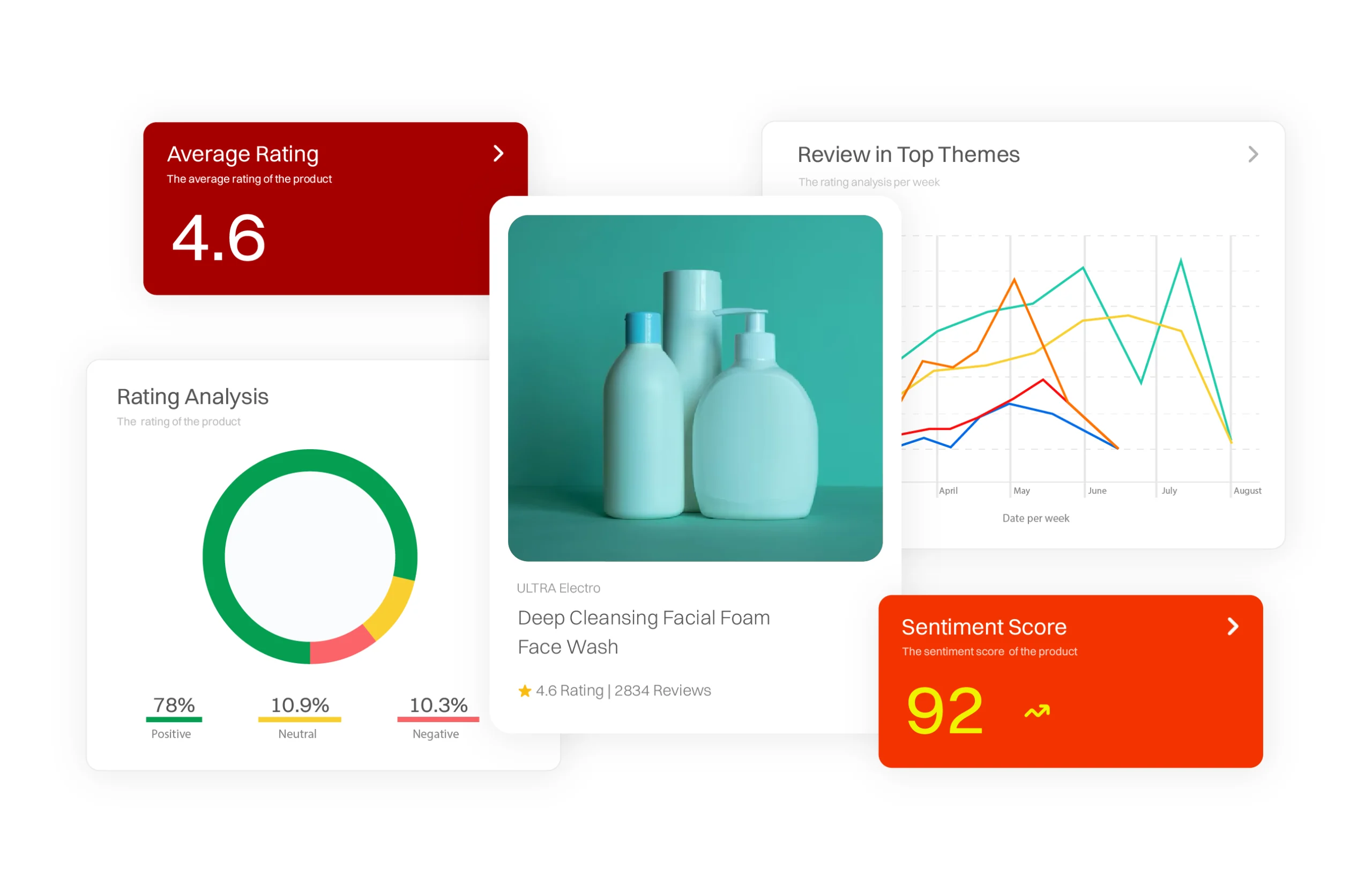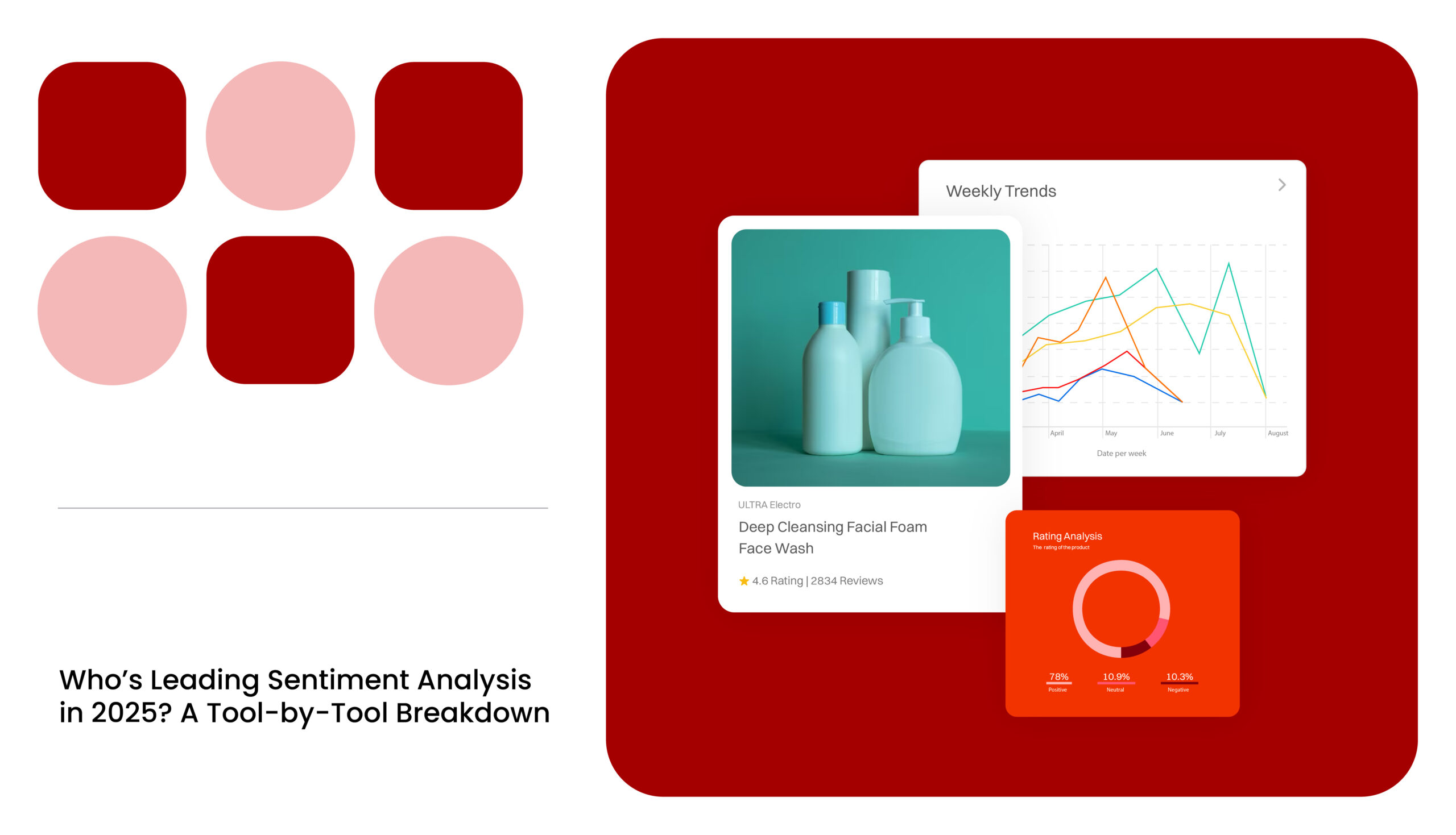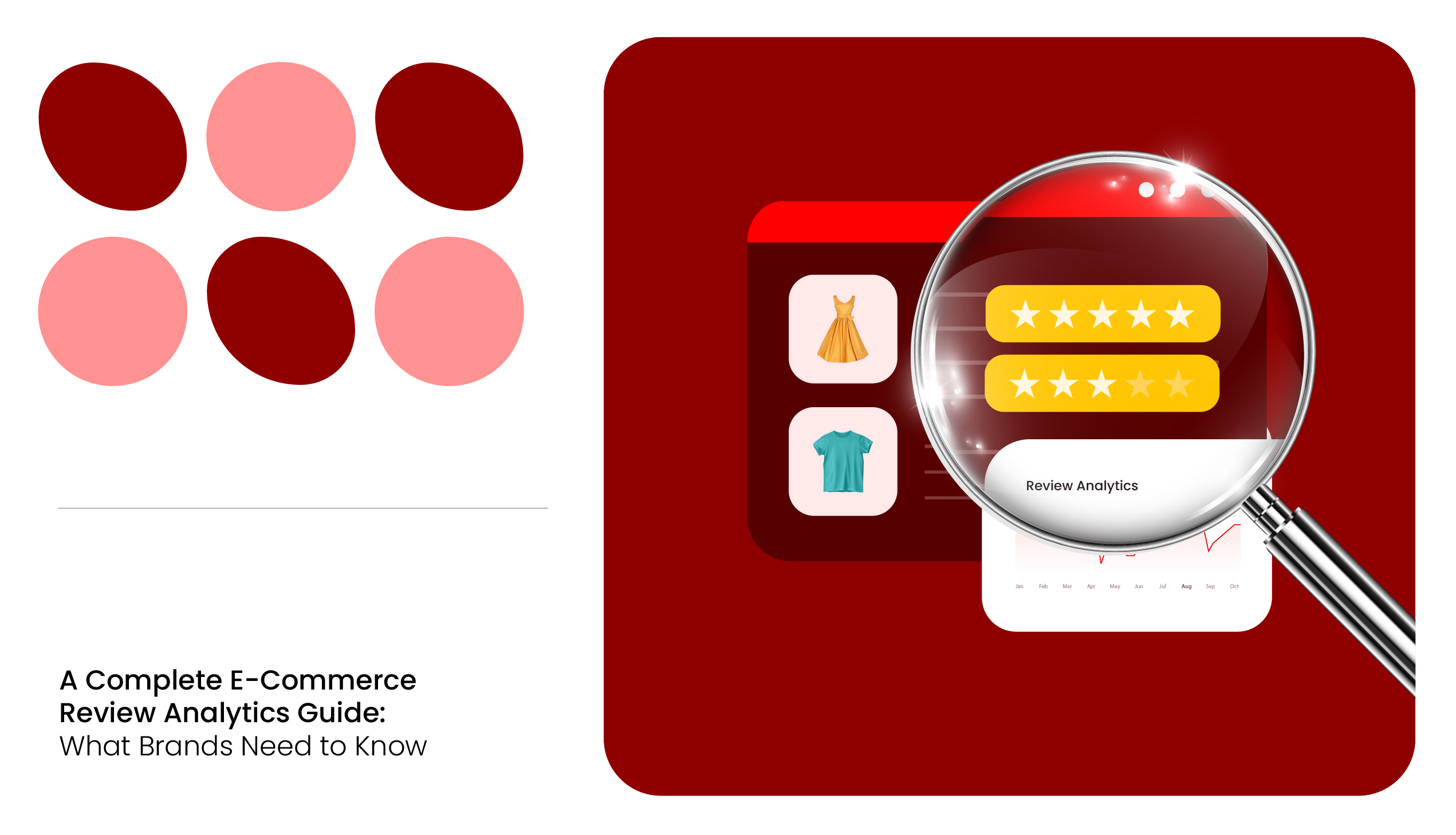Ever wonder what’s really behind those star ratings?
For e-commerce brands, reviews have become more than just social proof—they’re rich data sources. Every star rating, comment, and complaint reveals something about your product, your customer experience, and even your competitors.
But sorting through thousands of reviews manually? Not scalable.
That’s why more brands are turning to sentiment analysis tools, especially AI-powered platforms that break down customer feedback at scale. In this blog, we’ll explore the top sentiment analysis tools in 2026, with a focus on how they extract insights from reviews.
MetricsCart

MetricsCart specializes in e-commerce review analytics, with its sentiment analysis centered on product feedback. It automatically scans customer reviews, classifying each comment as positive, negative, or neutral. It also quantifies a sentiment score in real time, so you can see at a glance how customers feel about a product.
The platform goes further by extracting key themes from reviews, grouping recurring words (such as “battery” or “shipping”) into categories like product quality or delivery. This thematic review analysis helps pinpoint underlying issues or strengths without the need for manual sorting.
Moreover, MetricsCart lets you go beyond broad benchmarks; you can directly compare sentiment scores, NPS, review quality, and engagement levels against your top competitors. It’s the fastest way to see where you’re winning, where you’re lagging, and how to close the gap.
In short, MetricsCart turns customer sentiment on online marketplaces into actionable business intelligence. Its advanced review analysis “helps sellers harness the power of sentiment analysis, delivering a superior customer experience.
Key Capabilities
- Sentiment Scoring
- Thematic Insights
- Product Trend Analysis
- NPS Tracking
- Customizable Marketplace Coverage upto 100 Retailers
- Real-Time Dashboards
- Cross-Channel Review Sentiment Analysis

Zonka Feedback
Zonka Feedback is an AI-powered Customer Feedback & Intelligence Platform that helps teams analyze sentiment across surveys, reviews, support tickets, in-app feedback, and omnichannel customer interactions. It uses advanced AI and NLP to automatically detect sentiment, emotions, intent, urgency, and recurring themes, giving businesses a unified view of customer sentiment at scale.
If you are looking to go beyond basic positive or negative labels and truly understand what is driving customer satisfaction, dissatisfaction, and churn, Zonka Feedback stands out as a strong sentiment analysis tool for 2026.
Key Capabilities:
- AI-Powered Sentiment, Emotion, and Intent Analysis
- Theme Detection and Auto-Tagging
- Omnichannel Feedback Unification
- Real-Time Dashboards and Alerts
Sprout Social
Sprout Social is a leader in social media management, and its sentiment analysis tools are tailored for social channels. It connects to major platforms, including Twitter, Facebook, Instagram, LinkedIn, and more, to monitor millions of conversations. Sprout’s AI-powered engine can detect sentiment even in complex text or emojis.
Sprout’s listening filters also let you drill into specific topics or keywords. You can segment sentiment by campaign, product, or competitor. Crucially, Sprout supports multilingual analysis, enabling global brands to understand feedback in multiple languages.
Key Capabilities:
- AI-Powered Listening
- Emoji & Context Understanding
- Trend Tracking
- Multilingual Support.
- Custom Queries
Sentisum
SentiSum is built to analyze customer conversations at scale, whether from helpdesk tickets, chats, surveys, or review platforms. It uses natural language processing (NLP) and AI to automatically assign sentiment labels (positive, negative, neutral) and topic categories.
If your team wants to reduce churn, improve agent training, or identify product bugs early, this is one of the top sentiment analysis tools for 2026.
Key Capabilities:
- Omnichannel Integration
- AI Auto-Tagging & Categorization
- Real-Time Alerts.
- Custom Dashboards.
Helium 10
Helium 10 is primarily an Amazon optimization suite. Its Review Insights feature enables sellers to analyze product reviews at scale, converting thousands of customer opinions into actionable sentiment summaries.
It’s excellent for sellers who want to refine products, improve customer experience, and boost ratings by understanding what people love and dislike about a listing.
Key Capabilities:
- Bulk Review Extraction
- Phrase Frequency & Sentiment Clusters
- Negative Review Isolation
- Listing Optimization Suggestions.
- Chrome Extension
READ MORE | Want to Select the Right Software to Analyze Your Reviews? Check out 10 Best Rating and Review Analysis Software for E-Commerce in 2025
Brandwatch
Brandwatch offers a suite of social listening and analytics tools, with sentiment analysis being a core component. Its Consumer Intelligence platform pulls data from social networks, blogs, forums, and news. Brandwatch’s listening tool automatically classifies sentiment in each mention and tracks your brand’s overall sentiment score.
Key Capabilities:
- Cross-Platform Monitoring.
- Sentiment Classification
- Historical Trends
- Audience Analysis
Lexalytics
Lexalytics offers text and sentiment analytics tailored to different industries. Its software is often embedded into customer experience (CX) platforms. Lexalytics’s engine supports over 30 languages and can analyze text from surveys, reviews, social media, and other sources.
It excels at customization: you can tweak models for industry jargon or brand-specific terms.
Key Capabilities:
- Multi-Source Analysis
- Multi-Language Analysis
- Industry Tuning
- Data Visualization
Brand24
Brand24 monitors thousands of online sources, including Twitter, Facebook, Instagram, YouTube, blogs, news sites, podcasts, and more. It detects mentions of your brand and evaluates whether they are positive, negative, or neutral.
Key Capabilities:
- Online Mention Tracking
- Basic Sentiment Detection
- Influencer Score & Reach Metrics
- Custom Alerts & PDF Reports
- Data Segmentation
Conclusion
Let’s be honest, tracking star ratings alone won’t cut it. What you need is a system that tells you why ratings are rising or falling, what customers are repeatedly mentioning, and how your product perception stacks up against competitors.
From catching product defects early to improving your listing copy based on recurring praise or complaints, review sentiment analysis helps you build a sharper, faster brand response loop.
MetricsCart makes this process painless, with automated topic detection, trend spotting, and competitive comparisons, all tailored for marketplace brands.
Ready to Turn Customer Reviews into Product Strategy?
FAQs
Sentiment analysis uses AI and NLP to determine whether text (reviews, tweets, etc.) is positive, negative, or neutral. It helps companies gauge customer emotions without reading every comment manually.
Sentiment analysis tools can quickly process thousands of posts or reviews, highlighting overall trends. For instance, a tool might instantly flag a drop in sentiment after a product issue, letting you fix it fast.
First, define your needs: What channels matter (social media, review sites, surveys, call transcripts)? Next, verify if the tool supports the specified data sources and languages. Look for features such as real-time monitoring, customizable dashboards, and the accuracy of NLP. Finally, consider ease of use and integration: a good tool should fit smoothly into your workflow.
Yes. Modern tools often support dozens of languages.
Yes. Platforms like MetricsCart are designed for retail and e-commerce brands. It specializes in analyzing product reviews and marketplace data, not just social posts. MetricsCart provides real-time sentiment scoring and theme detection on reviews, along with customizable charts and heatmaps.







